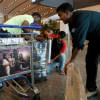We must honour our migrant workers, so others follow suit

Amdadul Haque from Narsingdi was determined to change his family's financial condition. He went to Singapore last week, believing that he could fulfil this dream by migrating abroad.
Like Amdadul, hundreds of migrant workers have left Bangladesh this year in hopes for the same. These overseas employees have achieved a remarkable milestone. A staggering 1.25 million workers have reportedly been sent abroad in 2023, exceeding last year's record of 1.14 million. The top destinations for Bangladeshis in 2023, like last year, are Saudi Arabia, Malaysia, Oman, UAE, Qatar, Singapore, and Kuwait.
We need a system wherein the whole recruitment process is transparent. Overall, good governance is required in the migration sector.
According to the Bureau of Manpower, Employment and Training (BMET) and the Ministry of Expatriates' Welfare and Overseas Employment, more than 12 million Bangladeshis are currently working abroad. These workers are the torchbearers for the country as it goes through a foreign exchange reserve crisis.
In 1971, Bangladesh was one of the poorest countries in the world. But over the last decade, we became the fastest growing economy in Asia and the Pacific. And remittance from migrant workers played a vital role in this achievement. According to the World Migration Report 2022 by the International Organization for Migration (IOM), Bangladesh is the sixth-largest labour-sending country and the seventh-largest in terms of earning remittance. In the last fiscal year, our migrants sent home almost $22 billion, which is six times higher than the country's total foreign aid or foreign direct investment.
In the last five decades, migrant workers have sent back a total of $296 billion in remittances. It is because of this remittance that Bangladesh is no longer considered a poor country and is not dependent on foreign aid.
In my opinion, Bangladesh is a country of "EFG," where "E" stands for expatriate workers, "F" for farmers, and "G" for garment workers. Though these three categories of people make up Bangladesh's biggest driving force, their rights are regularly exploited. We acknowledge the remittance but not the migrant workers who earn them. Instead, they face trouble throughout the migration process.
According to the World Bank and the IOM, the cost of labour migration from Bangladesh is the highest in the world, but the income of Bangladeshi migrants is the lowest. The Bangladesh Bureau of Statistics (BBS) conducted a large-scale survey on the cost of migration from Bangladesh in 2020, revealing that our workers spend around Tk 4.71 lakh each to go abroad. The report says that Bangladeshi workers need nearly 18 months to recover their migration costs. Though the government has fixed the migration cost to 14 countries at a maximum of Tk 1.66 lakh, jobseekers have to pay three to six times higher.
This mismatch is due to the migration process being driven by middlemen who charge hefty amounts for their services. Visa trading is also a common practice, wherein middlemen are involved in the illegal selling and buying of work visas, ultimately adding to the cost of migration. In this regard, the government needs to be vocal about employers' pay models for recruitment. If an organisation in a destination country is in need of an employee, it should also be the employer's responsibility to bear the recruitment costs.
However, high migration costs are not the only problem. Being issued a passport, getting a visa, and acquiring medical test results are all problematic, and the services are not the easiest to access. And after facing all these barriers, when a migrant finally reaches their destination, they are often exploited through a low salary or no salary, inhuman workload, dire living situations, exploitation, abuse, and even death in some cases.
It is also a common allegation of migrant workers that whenever they visit the Bangladeshi mission in their destination country in times of difficulty, they often face neglect. And, upon returning home after long periods of time, they also face harassment at the airport in Dhaka.
Many of our migrant workers also return empty-handed, especially female workers who are tortured and sexually abused while living abroad in utter despair.
A positive is that under the Recovery and Advancement of Informal Sector (RAISE) project, 30 welfare centres have been launched in 30 districts of the country, with the aim of reintegrating migrant workers who have returned from abroad. But the best initiative in 2023 for migrants has been the Probash scheme under the Universal Pension Scheme. Any expatriate Bangladeshi can participate in the Probash scheme by paying Tk 5,000, Tk 7,500 or Tk 10,000 in foreign currency as monthly instalments for at least 10 years. If a migrant pays Tk 10,000 monthly for 42 years, they will get a monthly pension of Tk 3,44,655. If they pay instalments for 30 years, they will get a monthly pension of Tk 1,24,660.
The government has also introduced a new insurance scheme for expatriates with more facilities. A Bangladeshi migrant worker is now eligible for insurance coverage of Tk 10 lakh—up from Tk 4 lakh—for workplace death and permanent disabilities. For partial permanent disabilities, the amount varies between 10 percent and 50 percent of the insurance coverage.
While the government has indeed taken various positive initiatives in the field of migration, there is still a long way to go. Skilling up workers before they migrate is still a challenge. Additionally, options for more destination countries must be explored. We also need a system wherein the whole recruitment process is transparent. Overall, good governance is required in the migration sector.
We must understand that migrants are not money-making machines; they are human beings who deserve dignity and better care. We need to advocate the rights and dignity of migrant workers every day. If we do not respect our own citizens, no one abroad will. If we honour them today, other countries will be bound to care for them as well.
Shariful Hasan is associate director of the BRAC Migration Programme and Youth Platform and also a columnist.
Views expressed in this article are the author's own.
Follow The Daily Star Opinion on Facebook for the latest opinions, commentaries and analyses by experts and professionals. To contribute your article or letter to The Daily Star Opinion, see our guidelines for submission.

 For all latest news, follow The Daily Star's Google News channel.
For all latest news, follow The Daily Star's Google News channel. 










Comments